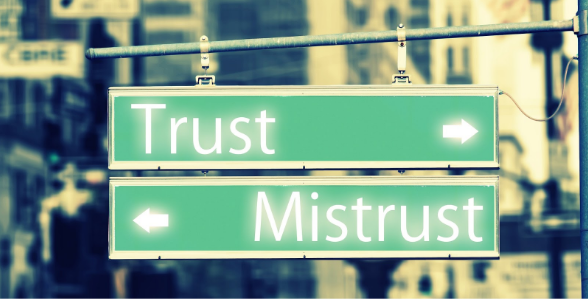 On 25th May 2020, a webinar titled “Trust Building for Effective Data Sharing as the Global Community Recovers from COVID-19” was organized by the CODATA Connect Alumni and Early Career Network. This was the fourth webinar in the series on Smart and Resilient Cities, while other webinars are planned in the coming months throughout 2020. Dr. Shaily Gandhi of CODATA Connect introduced the speaker and theme of the webinar series. As introduced, the speaker Ms. Theresa Dirndorfer Anderson is a data and information ethicist passionate about shaping future digital and data infrastructures. Based in Sydney, Australia, she is an active contributor to local and international initiatives to humanize data science. Theresa’s award-winning work as an educator and as a researcher for the past twenty years engages with the ever-evolving relationship between people and emerging technologies through transdisciplinary and value-sensitive lenses. Her scholarly work involves the fundamental concepts of uncertainty, relevance and resilience. Before her academic career, Theresa worked as an analyst in research centres and think tanks. She has also worked as a diplomat and environmental education officer.
On 25th May 2020, a webinar titled “Trust Building for Effective Data Sharing as the Global Community Recovers from COVID-19” was organized by the CODATA Connect Alumni and Early Career Network. This was the fourth webinar in the series on Smart and Resilient Cities, while other webinars are planned in the coming months throughout 2020. Dr. Shaily Gandhi of CODATA Connect introduced the speaker and theme of the webinar series. As introduced, the speaker Ms. Theresa Dirndorfer Anderson is a data and information ethicist passionate about shaping future digital and data infrastructures. Based in Sydney, Australia, she is an active contributor to local and international initiatives to humanize data science. Theresa’s award-winning work as an educator and as a researcher for the past twenty years engages with the ever-evolving relationship between people and emerging technologies through transdisciplinary and value-sensitive lenses. Her scholarly work involves the fundamental concepts of uncertainty, relevance and resilience. Before her academic career, Theresa worked as an analyst in research centres and think tanks. She has also worked as a diplomat and environmental education officer.
Theresa began her talk introducing the matter of trust in everyday life. Based on the literature, she opined, “Trust implies a projection; it involves a judgment that mobilizes both rational and emotional components, direct and indirect experiences.” She further stated that “Trust today is granted on two distinct attributes: competence, delivering on promises, and ethical behaviour, doing the right thing and working to improve society.” In this context, she explained ‘Building Trust’ in four quadrants, namely, ‘Reassurance’ encompassing communication and professionalism, ‘Resilience’ involving persistence and creativity, ‘Relationships’ embracing building and maintaining connections, and ‘Reflection’ involving time to think and test. She opined that trust-building is a matter of personal, local, and political choices. Through an audience poll, she demonstrated that the key to creating a trustworthy organization involves the government and legal frameworks, leadership from within the organization, governance frameworks within the organization, societal pressure, and citizen activism in equal measure. Then she presented evidence from the Edelman Trust Barometer 2020 survey that shows trust restores balance and enables partnership. Among those who trust, institutions are more closely aligned. She opined that there is a need to demonstrate trustworthiness for tiding over the uncertainties and vulnerabilities in extreme situations such as the post-COVID19 world order. Building trust is needed from inside that involves working within the community and for the community, while accepting risk, responsibility, and accountability help in mitigating risks. She then presented her model of locating, trust-building, and ethical data practice in a sociotechnical framework, where she emphasized the gradual progression toward establishing legitimacy, working towards acceptance, establishing credibility, gaining and maintaining trust, and codesign. She elaborates on the ways forward in building public-trust with wellbeing as our driver, encompassing 4Rs, namely, Reassurance, Resilience, Relationships, and Reflection. She brought in the insight from indigenous data sovereignty and indigenous data governance that the Global Indigenous Data Alliance (GIDA) promotes with the #BeFAIRandCARE campaign. Here FAIR Data supplements CARE data principles that stand for the collective benefit, authority to control, responsibility, and ethics. In her closing remark, she emphasized that public-trust is not lightly given; it is earned over time and is an ongoing process of engagement with the community.
Mr. Felix Emeka Anyiam of the CODATA Connect moderated the Question and Answer session and was assigned to obtain questions from the online participants keyed into the webinar question handle. Some of the questions were related to the live surveys Theresa was doing using Menti.com. A participant commented on the Trust Barometer 2020 survey concerning some governments’ competency in building trust.
The session was concluded with a vote of thanks presented by Shaily. She also announced the forthcoming activities of the CODATA Connect, including an Essay Writing Competition on “Open Data Challenges to Address Global and Societal Issues”, launching our second webinar series “Research Skill Development”, and Smart and Sustainable Cities Datathon for the CODATA alumni and early career professionals.
Prepared by:
Anup Kumar Das
(Jawaharlal Nehru University, India, anup_csp@jnu.ac.in)
